Perform is a project funded by the European Union under its Horizon 2020 framework program to innovate science education methods. It aims to combine performing arts and scientific research through participatory learning processes involving students from secondary schools, their teachers, early career researchers and science communicators.
During three years, PERFORM conducted participatory action research with around 3000 secondary school students, 100 teachers and 100 early career researchers in three piloting countries (France, Spain and the UK) to analyse the impact of researchers’ interaction and drama-based techniques when learning science on students’ views of science and their motivations for studying STEM careers. Enjoy the resources and tools we produced during this enriching journey!
____________________________________________________________________________________________________________________
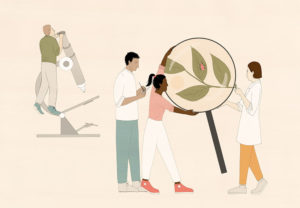 Perform academic research papers
Perform academic research papers
PERFORM science communicators designed innovative performance-based science education activities (PERSEIAs) addressing the human dimension of science and RRI values by testing different approaches with students: clown based on improvisation theatre in France, stand-up comedy in Spain, and science busking in the UK. Based on this experience, and in a transdisciplinary community of practice, PERFORM science communicators supported by academic partners designed and implemented a participatory educational process that guided students to co-produce their own scientific monologues, busks and theatrical pieces with their teachers and participant researchers. Academic partners evaluated its impact on students’ learning and engagement in STEM according to a set of expert-based and participatory indicators assessing the inclusion of the RRI values, potential changes in students’ attitudes, knowledge and perceptions towards science and the acquisition of the transversal competences needed to pursue STEM careers. The conceptualisation and results of this assessment were included in three academic publications of international scope. Also, for assessment purposes, qualitative research was conducted on the role of social media in young people’s responses to PERSEIAs.
– “Responsible research and innovation indicators for science education assessment: how to measure the impact?” published at International Journal of Science Education, Volume 39 in 2017: https://www.tandfonline.com/doi/full/10.1080/09500693.2017.1392643
– “From White Lab Coats and Crazy Hair to Actual Scientists: Exploring the Impact of Researcher Interaction and Performing Arts on Students’ Perceptions and Motivation for Science ” is now published in Volume 40, Issue 6 of Science Communication and is available at “https://doi.org/10.1177/1075547018808025”
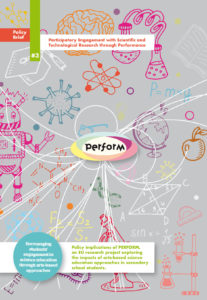
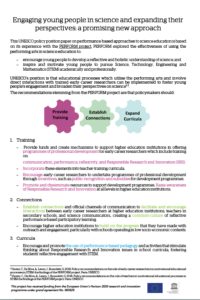
PERFORM Policy Brief and Position Paper
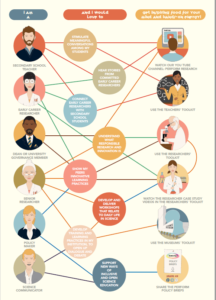 PERFORM poster and animation
PERFORM poster and animation
As a way of disseminating in an attractive and engaging way, we developed a printed and digital version of a poster, that nicely shows the paths you can follow in our website, and that will lead you to different tools and resources.
A whiteboard animation is another way of spreading the word and supporting the legacy of PERFORM.
Enjoy and share!
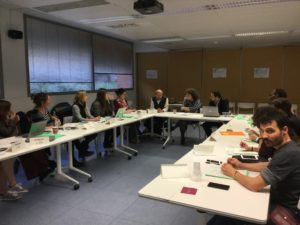 PERFORM Final review meeting: celebrating achievements!
PERFORM Final review meeting: celebrating achievements!
The EC PO Zakaria Benameur and the external reviewer Olena Smyntyna made a highly positive evaluation of PERFORM. The PO highlighted that “it has been a nice project, with a good and united consortium and perfectly managed”. Because of that, he suggested PERFORM participation in two occasions in the EC Open Days.
Olena Smyntyna commented her satisfaction with being on the process of the project and that she enjoyed reading the technical report because it was clear and well-structured. She also congratulate the consortium for doing everything that was supposed to be done according the DoA.
Finally, the EC PO mentioned that it is important to maintain partnership alive, because from his point of view the consortium has a good potential, and suggested to look for opportunities to organize informal meetings among partners.
